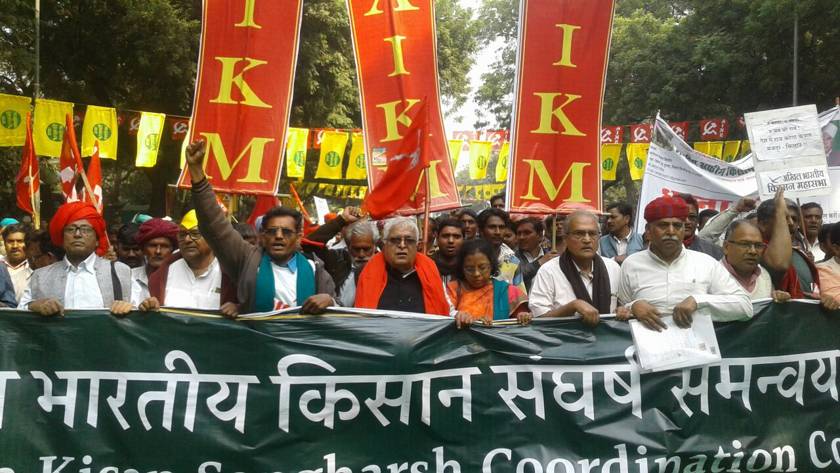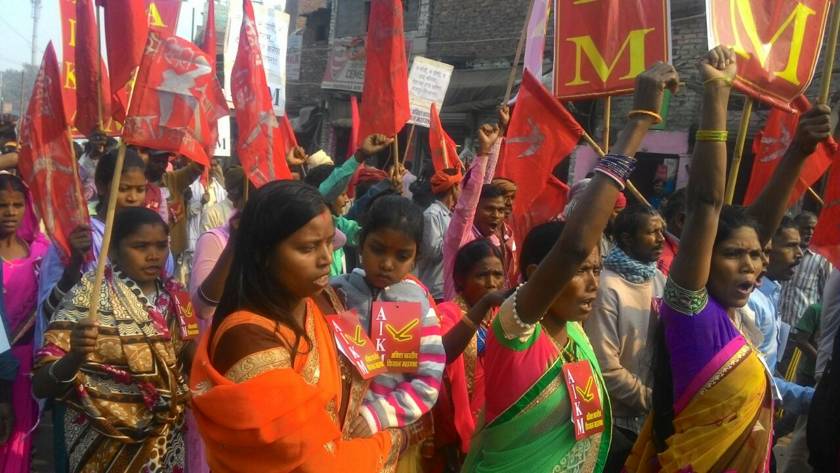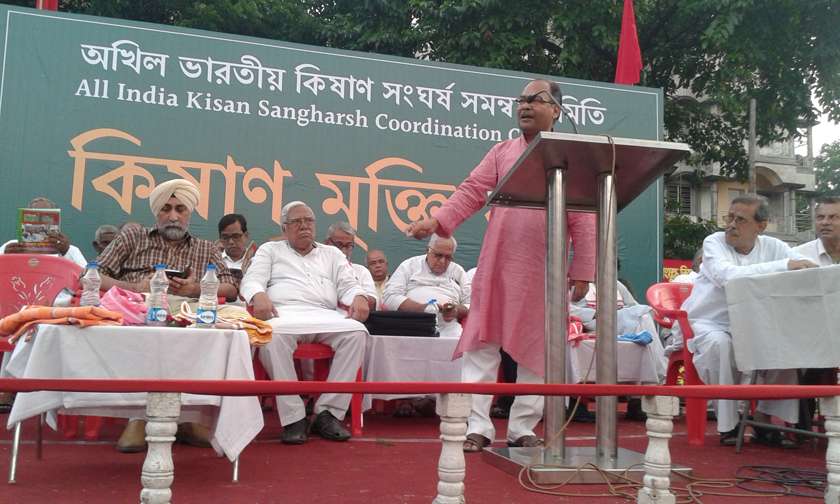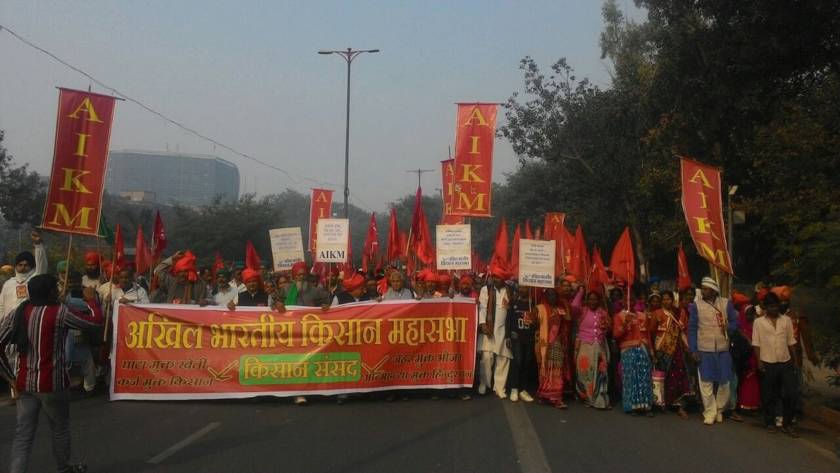
Present Bills To Free Farmers From Debt and Crisis
Thousands of farmers, poor peasants and agricultural workers from all over the country, under flags of varying colours representing the diverse peasants’ organisations, flooded Parliament Street in India’s capital Delhi, to hold a ‘Farmers’ Freedom Parliament’ of their own. Holding the Modi Government responsible for betraying its election-time promise of a one-time waiver of all farmers’ debts and fixing the minimum support price for crops with 50% margin of profit, the Kisan Mukti Sansad presented one Bill each on these two key demands.
The Kisan Mukti Sansad had been organised by the All India Kisan Sangharsh Coordination Committee (AIKSCC), a nationwide coalition of 184 farmers’ organizations. In the three months towards the Kisan Mukti Sansad, the AIKSCC held four Kisan Mukti Yatras covering nearly 10,000 kms all over the country, addressing farmers and non-farm communities, raising consciousness about farmers’ conditions, and building unity and solidarity in both rural and urban India around the farmers’ cause.
The KIsan Mukti Sansad began with a song about farmers’ struggles by Nirmohi, the revolutionary singer from Bhojpur.

The first day of the Kisan Mukti Sansad began with a Mahila Sansad (Women’s Parliament), acknowledging and highlighting the role of women as farmers. Women farmers spoke about how the denial of remunerative prices was nothing short of loot, and several women farmers spoke about how farm debts had pushed their husbands to suicide. Addressing the Mahila Sansad on behalf of the All India Kisan Mahasabha, Jasbir Kaur Nat spoke of women farmers’ and agricultural workers’ struggles.

Addressing the Kisan Mukti Sansad on the first day, AIKM General Secretary Rajaram Singh said that the Government tried to pit poor people against the farmers by claiming that raising minimum support prices for farmers would result in increased prices of food grains that would burden the poor. He said that this was a false contradiction: the Government had an obligation to reduce input costs for farmers, and to procure foodgrains from farmers at remunerative prices and ensure the distribution of those food grains to the poor by strengthening the public distribution system. Instead, the poor were dying of hunger, deprived of food rations on the pretext of Aadhaar. He said that while the sons of BJP leaders like Amit Shah were increasing their assets massively, and corporate loans were being waived, the Government was claiming to be unable to waive farmers’ loans. Rajaram Singh also stressed the need for the farmers’ movement to resist the Sangh-BJP attempts to divide farmers on communal lines, and to stand up for the rights of dairy farmers like Pehlu Khan, Ummar Khan and others who had been lynched by gau goons for being Muslim.
Hannan Mollah of the All India Kisan Sabha and Raju Shetty of the Swabhimani Shetkari Sangathana presented the two Bills on remunerative prices and loan waivers on the first day of the Kisan Mukti Sansad.
On the second day, the Kisan Mukti Sansad was addressed by AIKM National President Ruldu Singh and AIKM leader and Bihar MLA Sudama Prasad. Ruldu Singh declared that the farmers movement would resist the moves to humiliate debt-ridden farmers and auction off their property. Sudama Prasad said that 80% of Bihar’s farmers were sharecroppers and yet sharecroppers were not recognised as farmers – the farmers’ movement must include sharecroppers’ demands in its core agenda.
 The Kisan Mukti Sansad ended by declaring a plan for a nation-wide campaign to spread public consciousness about the two Bills. Beginning on 26th of November in Bardoli (Gujarat), AIKSCC will carry out a nation-wide communication campaign by way of seminars, public discussion, social media campaigns and publications. This campaign will culminate in a Kisan Mukti Diwas on Republic Day – 26th January – all over the country. The campaign will include 500 Kisan Mukti Charchas/Discussions across the country at district and sub-district level, as well as state-level Conventions centred around the two Bills released by AIKSCC; and handing over the Bills to Members of Parliament. Protests would also be held in Mandis during the Rabi 2017-18 season, against sale below MSP, or non-availability of Mandis. Further, any auctions of indebted farmers’ property and attempts to name-shame indebted farmers would be disrupted. This phase of the movement would culminate in a “Chetavni Satyagrah” (Satyagraha to Warn the Government) on Kisan Mukti Diwas on Republic Day.
The Kisan Mukti Sansad ended by declaring a plan for a nation-wide campaign to spread public consciousness about the two Bills. Beginning on 26th of November in Bardoli (Gujarat), AIKSCC will carry out a nation-wide communication campaign by way of seminars, public discussion, social media campaigns and publications. This campaign will culminate in a Kisan Mukti Diwas on Republic Day – 26th January – all over the country. The campaign will include 500 Kisan Mukti Charchas/Discussions across the country at district and sub-district level, as well as state-level Conventions centred around the two Bills released by AIKSCC; and handing over the Bills to Members of Parliament. Protests would also be held in Mandis during the Rabi 2017-18 season, against sale below MSP, or non-availability of Mandis. Further, any auctions of indebted farmers’ property and attempts to name-shame indebted farmers would be disrupted. This phase of the movement would culminate in a “Chetavni Satyagrah” (Satyagraha to Warn the Government) on Kisan Mukti Diwas on Republic Day.
